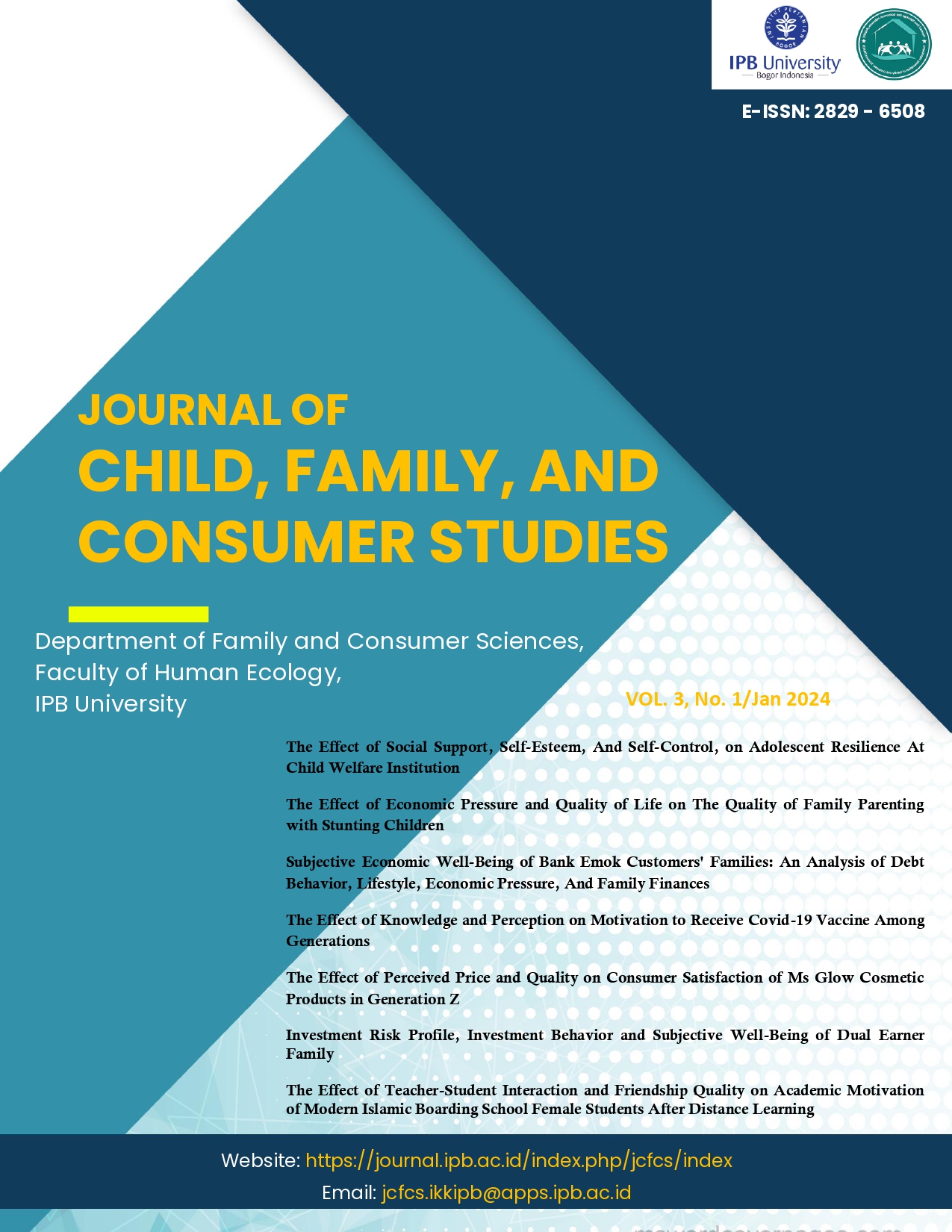SUBJECTIVE ECONOMIC WELL-BEING OF BANK EMOK CUSTOMERS' FAMILIES: AN ANALYSIS OF DEBT BEHAVIOR, LIFESTYLE, ECONOMIC PRESSURE, AND FAMILY FINANCES
Kesejahteraan Ekonomi Subjektif Keluarga Nasabah Bank Emok: Analisis Perilaku Berhutang, Gaya Hidup, Tekanan Ekonomi, Dan Keuangan Keluarga
Abstract
The utilization of money is not optimal, making the family's financial condition inefficient, which is why the family decides to get into debt at the Bank Emok. This study aims to analyze the influence of the family's debt behavior, lifestyle, economic pressure, and financial conditions (literacy and management) on the subjective economic well-being of Bank Emok customers in Bogor City. The research used a cross-sectional study design involving 150 families of Bank Emok customers selected by simple random sampling. The research instrument has adequate reliability and validity. The results of the analysis show that there are Bank Emok customers who are not categorized as poor. Many client families do not fulfill 12 years of primary education. Loans range from 2-16 million, with an average weekly installment of 138 thousand. As many as 26,7 percent of families fall into the category of high economic pressure, which is characterized by the difficulty of families in fulfilling food, education, and life skills. The results of the regression test show that the subjective economic welfare of families is positively influenced by lifestyle, financial literacy, financial management, number of dependents, length of wife's education, and length of loan. The analyzed model contributed 27,2 percent to the subjective economic well-being of families. Families are advised to start making financial plans and implement saving habits to be used in emergencies to improve the subjective economic well-being of the family.
References
Almenberg, J., Lusardi, A., Säve-Söderbergh, J., Vestman, R. (2018). Attitudes toward debt and debt behavior. The Scandinavian: Journal of Economics. 123(3), 780-809. doi:10.1111/sjoe.12419
Atkinson, A., Messy, F. (2012). Measuring financial literacy: Results of the OECD/International network on financial eduation (INFE) pilot study. [diakses 2020 Des 3]; (15). http://dx.doi.org/10.1787/5k9csfs90fr4-en.
Aprilia, E. D., Mahfudzi, R. (2020). Gaya hidup dan impulsive buying pada mahasiswa. Jurnal Ecopsy, 7 (2), 71-78. Doi: 10.20527/ecopsy.v7i2.7390
Chen, H., Volpe, R. P. (1998). An analysis of personal financial literacy among college students. Financial Services Review, 7(2), 107–128. doi:10.1016/s1057- 0810(99)80006-7.
Diener, E., Diener, R. B. (2009). Will money increase subjective well-being?: a literature review and guide to needed research. Social Indicators Research, 57, 119-169. https://www.jstor.org/stable/27526987
Diener, E., Diener, M., Diener, C. (1995). Factors predicting the subjective well-being of nations. Journal of Personality and Social Psychology, 69, 851–864. https://link.springer.com/chapter/10.1007/978-90-481-2352-0_3
Elder, G. H., Conger, R. D., Foster, E. M., Ardelt, M. (1992). Family Under Economic Pressured. Journal of Family Issues, 3(1), 5-37. Doi: https://doi.org/10.1177/019251392013001002
Frankenberger, T. R., Luther, K., Becth, J., McCaston, M. K. (2002). Household Livelihood Security Assesments. Atlanta: TANGO International Inc.
Firdaus, Sunarti, E. (2009). Hubungan antara tekanan ekonomi dan mekanisme koping dengan kesejahteraan keluarga wanita pemetik teh. Jurnal Ilmu Keluarga dan Konsumen, 2 (1), 21-31. DOI: https://doi.org/10.24156/jikk.2009.2.1.21
Hakim, F. A., Sunarti, E., Herawati, T. (2014). Manajemen keuangan dan kepuasan keuangan istri pada keluarga dengan suami istri bekerja. Jurnal Ilmu Keluarga & Konsumen. 7(3), 174–182. doi:10.24156/jikk.2014.7.3.174.
Herawati, T., Ginting, B., Asngari, P. S., Susanto, D., Puspitawati, H. (2011). Manajemen sumberdaya keluarga peserta program pemberdayaan masyarakat di kabupaten bogor. Jurnal Penyuluhan. 7(2), 38–47. doi:10.25015/penyuluhan.v7i2.9801.
Heripson. (2018). Analisis faktor-faktor yang mempengaruhi perilaku utang rumah tangga (sebuah kajian literature). Jurnal Ilmiah Ekonomi dan Bisnis. 15 (2), 89-101. DOI: https://doi.org/10.31849/jieb.v15i2.1156
Higginbotham, B., Felix, D. (2009). Economic predictors of marital quality among newly remarried rural and urban couples. Family Science Review. 14(2). Doi: 10.26536/fsr/2009.14.02.02.
Jappelli, T., Padula, M. (2011). Inverstment in financial literacy andsaving decisions, 1-36. Doi: 0.1017/S1474747214000377
Kapisa, M. B., Bauw, S. A,. Yap, R. A. (2021). Analisis tingkat pendidikan dan jenis pekerjaan terhadap pendapatan keada keluarga (KK) di Kampung Manbesar distrik Biak Utara Provinsi Papua. Lensa Ekonomi. 15(1), 131-150.
Katadata. 2022. Ada 204,7 juta pengguna internet di Indonesia awal 2022. Ahdiat A, wartawan. [diakses 2023 Jan 24]: https://databoks.katadata.co.id/datapublish/2022/03/23/ada-2047-juta-pengguna-internet-di-indonesia-awal-2022
Kotler, P., Armstrong, G. (2008). Prinsip-prinsip Pemasaran, Jilid 1. Jakarta (ID): Erlangga
Larasati, Setiawan, R. (2022). Perilaku meminjam masyarakat pengguna jasa Bank keliling. Jurnal Pendidikan Tambusai. 6 (2), 10810-10817. Doi: https://doi.org/10.31004/jptam.v6i2.4143
Lea, S. E. G., Webley, P., Levine, R. M. (1993). The economic psychology of consumer debt. Journal Economic Psychology. 14(1), 85–119. doi:10.1016/0167-4870(93)90041-I
Liman, S. P., Sarjana, I. M. (2021). Kedudukan Bank plecit dalam sistem perBankan Indonesia. Jurnal Kertha Wicara, 10 (3), 197-207. doi: 10.24843/KW.2021.v10.i03.p01
Mistry, R. S., Lowe, E. D., Benner, A. D., Chien, N. (2008). Expanding the family economic stress model: insights from a mixed-methods approach. Journal Marriage Family, 70, 196-209. doi: 10.24156/jikk.2010.3.1.1.
Mowen, C. J., Minor, M. (2002). Perilaku Konsumen. Jakarta (ID): Erlangga.
Mulyadi. (2018). Kesejahteraan, kualitas hidup dankaitannya dengan lingkungan hidup. Universitas Negeri Padang: Padang.
[OJK] Financial Services Authority. (2016). Survei Nasional Literasi dan Inklusi Keuangan 2016. Jakarta: Financial Services Authority
[OJK] Financial Services Authority. (2021). Strategi nasional literasi keuangan Indonesia 2021–2025. Jakarta: Financial Services Authority.
Parrota, J. L., Johnson, P. J. (1998). The impact on financial management and satisfaction of recently married individuals. Financial Counseling and Planning. 9 (2), 59-57.
Purwanto, A., Taftazani, B. M. (2018). Pengaruh jumlah tanggungan terhadap tingkat kesejahteraan ekonomi keluarga pekerja K3L Universitas Padjajaran. Focus: Jurnal Pekerjaan Sosial. 1(2), 33-43. doi: 10.24198/focus.v1i2.18255
Puspitawati, H. (2009). Pengaruh nilai ekonomi pekerjaan ibu rumah tangga terhadap kesejahteraan keluarga. Jurnal Ilmu Keluarga dan Konsumen, 2 (1), 11-20. doi: 10.24156/jikk.2009.2.1.11
Raharjo, I., Puspitawati, H., Krisnatuti, D. (2015). Tekanan ekonomi, manajemen keuangan, dan kesejahteraan pada keluarga muda. Jurnal Ilmu Keluarga dan Konsumen. 8(1), 38-48. Doi: https://doi.org/10.24156/jikk.2015.8.1.38
Sumarwan, U. (2017). Perilaku Konsumen: Teori dan penerapannya dalam pemasaran. Edisi kedua. Sikumbang R, editor. Bogor: penerbit Ghalia Indonesia.
Summers, J. K., Smith, L. M., Case, J. L., Linthurst, R. A. (2012). A Review of the Elements of Human Well-Being with an Emphasis on the Contribution of Ecosystem Services. Ambio. 41(4), 327–340. doi: 10.1007/s13280- 012-0256-7
Sunarti, E. (2006). Indikator keluarga sejahtera: sejarah pengembangan, evaluasi, dan keberlanjutannya. Bogor: IPB Press
Sunarti, E. (2018). Work stability, economic pressure and family welfare in Indonesia. The Social Sciences. 13 (6), 1186-1193. doi: 10.36478/sscience.2018.1186.1193
Sunarti, E. (2021). Inventori pengukuran keluarga. Bogor: IPB Press
Sunarti, E., Hernawati, N., Nuryani, N. (2009). The relationship between the function of adaption, goal attainment, and system maintenance with family well-being. Journal of Family Sciences. 2(1): 1-10
Sunarti, E., Prayitno, S. W., Ramadhan, D. A. (2020). Family resilience in the first month of covid-19 pandemi in Indonesia. Di dalam: The 3rd International Seminar on Family and Consumer Issues in Asia Pasific. Bogor
Sunarti, E., Kholifah, I., Vidiastuti, F., Kharisma, N., Rochimah, N., Herawati, T. (2013). Family vulnerability, family resource management, and family strength of aging family members. Paper presented at 5th International Work and Family Conference, University of Sydney, July 17-19.
Utaminingsih, N. L., Suwendra, I. W. (2022). Pengaruh pendapatan dan jumlah angota keluarga terhadap kesejahteraan keluarga di Keluarahan Karangasem. Ekuitas: Jurnal Pendidikan Ekonomi, 10 (2), 2549-2292. doi: 10.23887/ekuitas.v10i2.35304
Wenas, G. E., Opod, H., Pali, C. (2015). Hubungan kebahagiaan dan status soaial ekonomi keluarga di Keluragan Artembaga II Kota Bitung. Jurnal e-Biomedik, 3 (1), 532-538. doi: 10.35790/ebm.v3i1.7821










